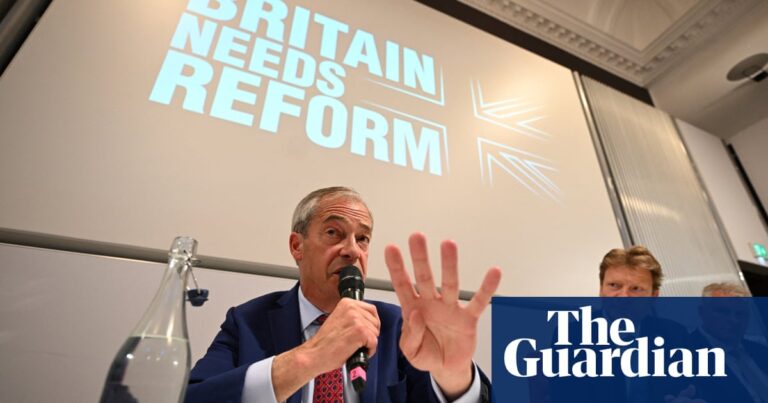Labour’s landslide victory was hailed as a ray of hope for progressives around the world, following a surge in support for far-right parties in Europe and Donald Trump’s narrow lead in January’s US presidential election.
But Britain’s bulwark against the populist and extremist wave sweeping European capitals may be practical as well as ideological: Nigel Farage’s right-wing Reform Party won 14 percent of the vote nationwide, closely matching the 16 percent won by Germany’s far-right Alternative for Germany (AfD) in the recent European Parliament elections.
The AfD currently sends a significant number of MEPs to Brussels. By contrast, in Britain’s single-member constituency system, where only the winners of each constituency are rewarded, the reformists received more than four million votes but only five seats in parliament.
A small group of reformists will certainly try to pressure the government and influence the Conservative Party as it reshuffles its leadership following last week’s crushing defeat, but they have little real power.
“If the UK were to become another [polling] “If the electoral system changes, we’re going to see the same level of polarization as we see elsewhere in Europe,” said Marta Lorimer, a politics lecturer at Cardiff University. “Some of the trends are just masked by the way the electoral system works.”
The nature of the UK voting system not only reduces the political influence of votes cast for smaller parties, whether Reform or the Greens, but may also deter some potential supporters from supporting the party in the first place.
In European elections, voters know that even a few members of a small party can form a coalition government, giving them a stronger incentive to choose with their heart rather than their head.
“After 14 years of Conservative government, [British] Voters wanted change and knew they had to choose between left and right,” Lorimer added.
Stephanie Walter, professor of international relations at the University of Zurich, said: “The relative success of smaller parties in the UK elections is due to the same political trends that are reshaping Europe, despite structural constraints on their ability to gain power.”
“Despite strong electoral incentives to vote for the two major parties in the UK, the vote is more divided and has greater impact.”
She said: “This reflects a wider division that we see across Europe. The European political spectrum used to be one-dimensional, with parties divided between left and right. Over the past 20 years, a second dimension has opened up, particularly around nationalism and openness, widening the space for competition and for parties with different political profiles.”
But this doesn’t just benefit populists or the right. The UK’s Greens and Liberal Democrats made big gains on Thursday, and proportional representation has seen left-wing governments return to Europe recently, even as the rise of the far-right has been the focus of media attention and political concern. In Spain last year, the Socialists held on to power in a surprise general election after faring poorly in local opinion polls. In France, a coalition of the left and Greens won a majority in President Emmanuel Macron’s surprise general election, while Marine Le Pen’s far-right National Rally was expected to sink to third place.
Professor Amelia Hadfield, founding director of the UK-Europe Centre, said that although Farage was very successful in pushing for a referendum on whether to leave the EU, he had essentially been a single-issue campaigner.
He may be taking inspiration from the success of populists in Europe and has vowed to launch a “great national movement” before the 2029 election. But the party across the Channel has spent years growing its support, gaining government experience and formulating a broader policy platform.
After newsletter promotion
“The question is whether Farage can harness some of the Brexit momentum,” Hadfield said. “He now needs to shift the leadership and personal-led structure. He will likely try to build it from the top down, along the lines of the more established populist parties.”
If the election result was not a simple victory for progressives or a shift away from populist tendencies, the transfer of power that followed on Friday morning was a clear victory for democracy.
Outgoing Conservative chancellor Rishi Sunak and outgoing chancellor Jeremy Hunt acknowledged both Labour’s victory and Mr Starmer’s dedication to public service, despite their political differences about how to best serve. Mr Starmer responded similarly.
A surge in support for the far-right has come with attacks on democratic institutions in many places. The storming of the U.S. Capitol on January 6th appears to have had little impact on Mr. Trump’s chances of winning the presidential election in November.
A mutual, possibly staged, statement of respect for British democracy and the will of the British electorate was therefore likely to be welcomed in the bipartisan spirit in which it was issued.
“Friendliness has been a part of British politics for a long time,” Hadfield said. “We haven’t seen much of it in recent years. The British people have long memories and they resent the loss of civility.”

